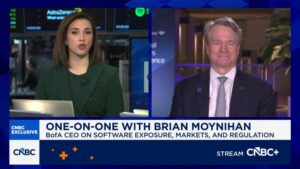Shares in FTSE 100 ‘Big Four’ UK bank NatWest (LSE: NWG) have risen 95% from their 13 November 12-month traded low of £1.95.
Such a rise might make some investors think the stock cannot rise much further. Others might believe it signals much greater gains to come from the shares.
Neither approach is optimal for securing high investment returns over time, in my experience as a former investment bank trader.
In my view, the only question worth asking in such a situation is whether there is any value left in the stock.
How does the value look here?
My starting point in ascertaining the value of any share is examining key measures I have found most useful over the years.
On the first of these – the price-to-earnings ratio (P/E) – NatWest currently trades at just 7.1. This is bottom of its competitor banks, which have an average P/E of 7.7. So it looks cheap on this basis.
To nail down how this looks in share price terms, I ran a discounted cash flow analysis. Using other analysts’ figures and my own, this shows NatWest shares are potentially 55% undervalued at their present price of £3.80.
Therefore, a fair price is £8.44, although they may go lower or higher than that of course, given market unpredictability.
Does the business look strong?
A key risk for NatWest, in my view, is declining net interest income (NII) as UK interest rates fall. This is the difference in the money it makes from interest paid on deposits and charged on loans. Indeed, in the first nine months of this year, its NII fell 1.2%, to £8.3bn.
However, its Q3 results released on 25 October showed an 8% year-on-year increase to £2.9bn. This resulted from an overall rise in its lending and deposit business. More specifically, net loans increased by £8.4bn in the quarter, while deposits increased by £2.2bn.
Overall, NatWest’s profit in Q3 came in at £1.67bn, beating analysts’ expectations of £1.5bn.
As a result, it upgraded its profit guidance for 2024 to £14.4bn from £14bn. It did the same for its return on tangible equity – to 15%+ from 14%+. This is the same as return on equity except that it excludes intangible elements such as goodwill.
Rising dividend forecasts
In 2023, the bank paid a total dividend of 17p, which yields 4.5% on the current £3.80 share price.
However, it increased its 2024 interim by 9%, to 6p from 5.5p. If this were applied to its entire dividend this year then the total payout would be 18.53p. Based on the present share price, this would yield 4.9%. The average yield on the FTSE 100 is 3.6%.
That said, analysts forecast the dividend in 2025 will increase to 19.7p and in 2026 to 22.8p.
Given the present share price, these would give respective yields of 5.2% and 6%.
My investment view
I already hold shares in NatWest, bought at a much lower price, so I am very happy with my holding.
If I did not have it I would buy the stock today for its strong growth prospects, undervaluation and rising dividend potential.
This post was originally published on Motley Fool







